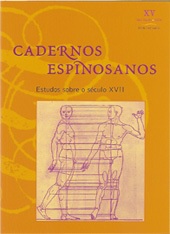Universality and symbolization in Leibniz
DOI:
https://doi.org/10.11606/issn.2447-9012.espinosa.2006.88971Abstract
Based on the conception of an integral rationalism, in which the ideal of a full demonstrability takes place according to the identitary paradigm of the truth, the question of universality is configured in Leibniz, which a would then be more pertinently enunciated as the subject of universal determinism. The following are two aspects of a single question: in the first place, universality in its architectural sense, corresponding to the totality; in the second place, the absolute determination of the singular individual. In one case as well as the orther, complete determination cannot be reached by the human mind. But symbolic determination operations allow, somehow, for the avoidance of the impossiblity of a simultaneous and articulate vision of all of the elements of a compound and, thus, we are lead in the direction of determinable universality. The fundaments, procedures and risks involved therein constitute the subject of this text.Downloads
Download data is not yet available.
Downloads
Published
2006-12-15
Issue
Section
Não definida
License
Autores que publicam nesta revista concordam com os seguintes termos:
- Autores mantém os direitos autorais e concedem à revista o direito de primeira publicação, com o trabalho simultaneamente licenciado sob a Licença Creative Commons Attribution que permite o compartilhamento do trabalho com reconhecimento da autoria e publicação inicial nesta revista.
- Autores têm autorização para assumir contratos adicionais separadamente, para distribuição não-exclusiva da versão do trabalho publicada nesta revista (ex.: publicar em repositório institucional ou como capítulo de livro), com reconhecimento de autoria e publicação inicial nesta revista.
Authors who publish in this journal agree to the following terms:
a. Authors retain copyright and grant the journal the right of first publication with the work simultaneously licensed under the Creative Commons Attribution License that allows to share the work with an acknowledgment of its authorship and initial publication in this journal.
b. Authors are authorized to take on additional contracts separately, to non-exclusive distribution of the article published in this journal (ex.: to publish in institutional repository or as part of a book), with an acknowledgment of its initial publication in this journal.
How to Cite
Silva, F. L. e. (2006). Universality and symbolization in Leibniz. Cadernos Espinosanos, 15, 41-58. https://doi.org/10.11606/issn.2447-9012.espinosa.2006.88971


